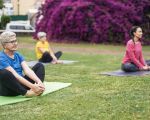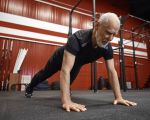Mental Wellness Strategies for Active Lifestyles
- Why Mental Wellness Matters for Active Lifestyles
- Incorporating Mindfulness into Your Activity Routine
- Balancing Physical and Mental Health
- Overcoming Mental Barriers in Physical Activity
- Practical Strategies for Mental Wellness
- Case Study: Mental Wellness Through Physical Activity
Why Mental Wellness Matters for Active Lifestyles
When we think of staying active, the focus is often on physical health—how many steps we walk, how far we run, or how much weight we lift. However, mental wellness is just as important, especially for those with active lifestyles. Mental health plays a significant role in how we perform, recover, and maintain long-term commitment to physical activity. An active lifestyle can be a powerful tool for improving mental well-being, but without mental wellness strategies, it can also lead to burnout, stress, and mental fatigue.
Taking care of your mental health while maintaining an active lifestyle is crucial to achieving balance and avoiding negative consequences such as anxiety, depression, or injury. It’s easy to get caught up in the physical aspect of fitness, but mental wellness should be equally prioritized. Incorporating strategies that promote mental health can enhance motivation, boost resilience, and help overcome the mental barriers that often arise during challenging physical activities.
Incorporating Mindfulness into Your Activity Routine
One of the most effective mental wellness strategies for an active lifestyle is incorporating mindfulness into your fitness routine. Mindfulness refers to being fully present in the moment, paying attention to your thoughts, feelings, and sensations without judgment. By practicing mindfulness during physical activity, you can enhance your focus, reduce stress, and improve overall performance.
Mindfulness doesn’t require special equipment or extra time—simply pay attention to how your body feels during each movement. Whether you’re walking, running, cycling, or lifting weights, bring awareness to your breath, posture, and movement. This can help you stay grounded and calm, especially when you face challenging moments. Research shows that mindfulness can reduce anxiety, lower blood pressure, and improve cognitive function, making it an excellent addition to any workout routine.
For example, try incorporating breathing exercises before or after your workout. Deep breathing not only helps activate the parasympathetic nervous system (which promotes relaxation) but also improves oxygen delivery to the muscles, enhancing recovery. Mindfulness in movement, such as focusing on each muscle as it contracts and relaxes, also builds mental resilience, helping you stay focused on your goals even when faced with obstacles.
Balancing Physical and Mental Health
Striking a balance between physical and mental health is essential for anyone with an active lifestyle. Too often, people focus on the physical aspect of fitness, neglecting the importance of mental health. Over-exercising or pushing yourself too hard can lead to physical injuries, exhaustion, or burnout. Conversely, neglecting exercise for the sake of mental health can lead to feelings of sluggishness, anxiety, and even depression.
To maintain a healthy balance, it’s important to listen to your body and give yourself permission to rest. Rest days are as crucial as workout days for both physical and mental recovery. Taking time off from exercise allows both the body and mind to reset, reducing stress levels and preventing mental fatigue. Incorporating activities that promote relaxation, such as yoga, stretching, or meditation, can further support both your physical and mental health goals.
A key element of this balance is setting realistic goals that are both achievable and sustainable. Instead of striving for extreme fitness goals that may cause unnecessary stress, set smaller, more manageable goals that allow you to build consistent habits over time. Celebrate the small victories, and remember that your mental wellness is just as important as your physical progress.
Overcoming Mental Barriers in Physical Activity
Mental barriers, such as fear of failure, self-doubt, and negative thinking, can often hold us back from reaching our fitness goals. Overcoming these mental barriers is crucial for maintaining motivation and consistency in an active lifestyle. The first step is acknowledging these thoughts and not allowing them to define your ability or progress.
One way to overcome mental barriers is by reframing negative thoughts into positive affirmations. For example, instead of thinking, “I’m too tired to finish this workout,” reframe it to, “I’m strong enough to complete this, and I’ll feel great after.” This simple shift in mindset can have a profound impact on your motivation and performance.
Another technique is setting clear, achievable goals that build confidence over time. Start with small, attainable goals and gradually work your way up. Each success, no matter how minor, will reinforce your belief in your ability to overcome challenges and push through mental barriers. Building a support system with like-minded individuals can also help keep you accountable and motivated, whether it’s through group fitness classes, sports teams, or online communities.
Practical Strategies for Mental Wellness
Incorporating mental wellness strategies into your active lifestyle doesn’t have to be complicated. Here are some practical tips to help improve both your mental and physical well-being:
1. Establish a Routine
Having a consistent routine is key to maintaining mental wellness. Set aside specific times each week for exercise, rest, and self-care. This helps create structure and reduces stress by eliminating the need to constantly make decisions about when and how to exercise.
2. Practice Gratitude
Start or end your workout with a moment of gratitude. Focusing on the things you’re thankful for, such as your health or the ability to exercise, can shift your mindset and improve mental clarity. Studies show that practicing gratitude can increase happiness and lower stress levels.
3. Stay Socially Connected
Exercise doesn’t have to be a solitary activity. Engaging with others in physical activities can improve your mental health and foster a sense of community. Whether through group workouts, hiking with friends, or joining a team sport, socializing while being active can boost your mood and make exercise feel more enjoyable.
4. Focus on Self-Care
Incorporate self-care practices into your routine, such as stretching, taking baths, or practicing mindfulness meditation. Taking care of your mind and body outside of exercise is just as important as the workout itself. Self-care reduces stress, improves mood, and helps you maintain a positive mindset.
Case Study: Mental Wellness Through Physical Activity
Let’s consider the example of Sarah, a professional who had been struggling with anxiety and stress due to her busy work schedule. She decided to incorporate regular physical activity into her routine as a way to combat her mental health challenges. Initially, Sarah struggled with self-doubt and a lack of motivation, but over time, she began practicing mindfulness during her runs and setting small, achievable goals. She noticed that her stress levels decreased, and her anxiety symptoms lessened significantly.
Sarah also took the time to connect with a local running group, which provided her with a support system and made her exercise routine more enjoyable. By focusing on both her physical and mental health, Sarah was able to maintain a consistent fitness routine and improve her overall well-being. Her story highlights the power of combining physical activity with mental wellness strategies, ultimately leading to a more balanced and fulfilling lifestyle.








